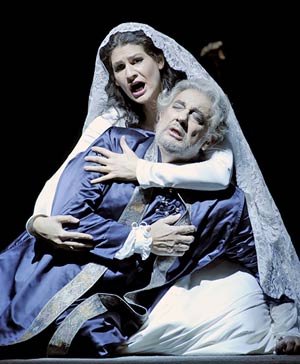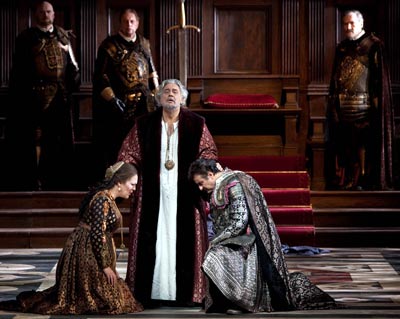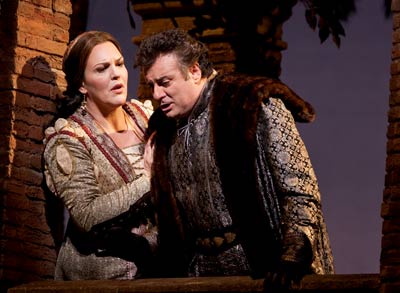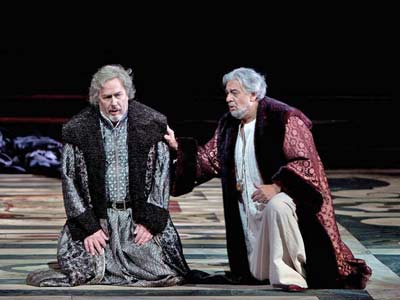Dear Fellow Opera Lovers:
Before you do anything else – before you even finish reading this review – go to the website of your nearest theatre which shows¬†European HD operas¬†(if you don’t know where it is, go to:¬†emergingpictures.com/opera-in-cinema/theaters/ and enter your zip code) and check their web page to see if the¬†La Scala¬†production of¬†Simon Boccanegra¬†will be playing in the future.¬† If it is, plan to go; if it is not, you have my sympathy.

Simon Boccanegra at La Scala
Sara and I saw it last night at Cinema 7 in nearby Campbell.  When we left the theater we both felt emotionally drained.  There was a definite lump in my throat when father and daughter realized their relationship, and a bigger one when Simon and Jacopo Fiesco were finally reconciled at the end.
Plť°cido Domingo¬†was incredible.¬† He was the Doge.¬† He dominated.¬† He ruled.¬† He suffered.¬† Science says that a man’s voice at 69 has lost something from when he was 40 something.¬† You¬†couldn’t prove it by me.¬† My unsophisticated ear couldn’t detect the slightest quaver or lack of tone or volume or subtlety in his voice.

And the rest of the cast was worthy of him.¬†¬†Anja Harteros¬†was particularly effective as Amelia.¬†Ferruccio Furlanetto¬†truly caught the essence of the patrician Jacopo Fiesco – a stern and unyielding bigot – he wants to kill Boccanegra, but only in a fair fight (which he would probably lose because he’s a generation older), but he’ll go to jail rather than participate in a plot to poison him or stab him in the back.¬†Massimo Cavalletti¬†was convincing as the villain, Paolo Albiani.¬†Fabio Sartori¬†didn’t have quite the acting ability of the others in the part of Gabriele Adorno, but there was nothing wrong with his voice.

There is no question but that my enjoyment – my thrill – at the performance was increased by the fact that the title role was sung by Domingo.¬† There was something about his presence that made him my favorite among the “Three Tenors” when I watched their memorable concert on TV twenty years ago.¬† His durability is amazing.¬† This past¬†year I have had mixed feelings when I saw/heard Samuel¬†Ramey¬†and¬†James Morris¬†in relatively minor roles.¬† On the one¬†hand I was pleased that they could still perform creditably after all those years, but on the other hand I was sad that they were now so much less than they had been twenty years ago.¬† Not so with¬†Plť°cido Domingo.¬† He was as great as ever in a role that was not only new, but was usually sung by a baritone!¬† I even got excited about the curtain call as I imagined how I would feel if I were one of that audience that I saw on the screen.¬† In¬†La Scala, on my feet, applauding with all my might and shouting, “Bravo.”¬† Imagine.¬† It was almost half a century ago that he made his U. S. operatic debut in Dallas, singing the role of Arturo opposite¬†Joan Sutherland’s Lucia!
The story has some basis in fact.  A former Christian pirate named Simon Boccanegra was elected the first Doge of Genoa in 1339 over the patrician Jacopo Fiesco.  He negotiated some treaties during his reign, and when he died of poison, he was succeeded by the plebian Gabriele Adorno.  But my cursory research on the web did not indicate the existence of Amelia or of any personal relationship among the various families.  And his treaties were soon broken.
Regardless of what the character of the real Simon may or may not have been, the character created by Verdi and his librettist Boito is truly admirable and centuries ahead of his time.  Politically he thought it was more important to try for peace rather than just try to be victorious in war.  And he allowed his daughter to marry the man of her choice even though he knew it would be politically unwise (it turned out to be fatal).  How many other operatic heroes can you truly admire?  You can like them (the Prince in La Cenerentola), you can hate them (Pinkerton in Madama Butterfly), you can pity them (Rudolpho in La Boheme), you can have complex mixed feelings (Rigoletto), you can love them in spite of their stupidity (almost all tenor heroes), but admire?  Name one.
There is one drawback to being able to see so many operas.¬† I don’t always maintain sharp memories of any particular opera.¬† That is one reason that I started writing about operas that particularly impressed me some years before I had even heard of SPLASH MAGAZINE.¬† So, rather than make what well might be misleading comparisons of last night’s La Scala’s HD performance with last February’s performance from the¬†Met, let me simply give you now what I wrote then, and let you make your own comparisons. Though I’ve added a couple of pictures, I haven’t changed a word.
Simon Boccanegra at the Met

Simon blesses his daughter Amelia (Adrianne Pieczonka) and her husband Gabriele Adorno (Marcello Giordani)
Wow, what a performance.  Simon is definitely in my top ten list of operas.
I have a dim memory of having seen this opera on TV many years ago, but I had no conscious memory of what it was about or of anything in it. ¬†But as I watched it this morning, some of the plot came back to me, and so did occasional bits of scenery. Could I have seen it on TV years ago? ¬†I know this¬†Met¬†production is not a new one; indeed in one of the interviews it came out that¬†Plť°cido Domingo¬†had sung the tenor lead when it was last produced in 19-something. ¬†All of which is really in parentheses – the important thing is that most of the plot twists, including the ending, struck me as being unfamiliar.
And I mean “struck me” almost literally. ¬†I felt stunned as the first act curtain came down – and the last two acts were hardly anticlimactic.
Why isn’t it performed more often? ¬†OK, perhaps the music isn’t quite as immediately great as Rigoletto¬†or¬†La Traviata¬†– but that’s really praising with faint damns. ¬† But offhand I can’t think of a plot that has more depth to it. ¬†And is there any other opera where the lead female part is more than 29 years old? ¬†(and I mean the “character”; the “soprano” is usually more than 39).
More than once when I’ve just seen an opera I think, “I wish my parents could have seen this with me,” but never as strongly as today. ¬†¬†Plť°cido Domingo¬†and¬†James Morris¬†singing a duet with James Levine¬†conducting. ¬†These three were coming stars when Mother and Dad went to the Met – and they are still stars today. ¬†Don’t miss¬†Renee Fleming’s interviews with them.
And does anyone write male duets like Verdi does? (In fact, does anyone else write male duets?).  They have a couple of numbers here in the same league as the one in Don Carlos.
I hope that the Met will put this production in its regular rotation and that they will put it on their HD program again in the near future.
C A S T S
ROLE                              MET                                   LA SCALA
Simon Boccanegra¬†¬†¬† Plť°cido Domingo¬†¬†¬†¬†¬†¬†¬†¬†¬†¬†¬†¬†¬†¬† Plť°cido Domingo
Amelia                         Adrianne Pieczonka           Anja Harteros
Gabriele Adorno        Marcello Giordani               Fabio Sartori
Jacopo Fiesco            James Morris                     Ferruccio Furlanetto
Paolo Albiani             Stephen Gaertner              Massimo Cavalletti
Conductor                   James Levine                     Daniel Barenboim
Photos by                    Marty Sohl                         (various)
MET
Camera 7, Pruneyard
1875 S. Bascom Avenue
Campbell, CA 95008
(408) 998-3022, x10
cameracinema@aol.com
LA SCALA
Cinemark
3000 El Camino Real # 6
Palo Alto, CA 94306-2110
(650) 493-3456
cinemark.com
This review by Philip G Hodge appeared in sanfranciscosplash.com on June 22, 2010.



